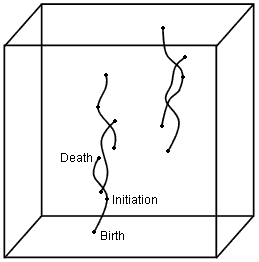Video - Rick Perry's big prayer rally
Another advantage for Perry is support from an extensive 50-state “prayer warrior” network, organized by the New Apostolic Reformation. A religious-political movement whose leaders call themselves apostles and prophets, NAR shares its agenda for control of society and government with other “dominionists,” but has a distinctly different theology than other groups in the Religious Right. They have their roots in Pentecostalism (though their theology has been denounced as a heresy by Pentecostal denominations in the past). The movement is controversial, even inside conservative evangelical circles. Nevertheless, Perry took the gamble that NAR could help him win the primaries, a testament to the power of the apostles’ 50-state prayer warrior network.
While it may not have been obvious to those outside the movement, Perry was publicly anointed as the apostles’ candidate for president in his massive prayer rally a few weeks ago, an event filled with symbolism and coded messages. This was live-streamed to churches across the nation and on God TV, a Jerusalem-based evangelical network.
There’s little doubt that Perry is NAR's candidate -- its chosen vehicle to advance the stated agenda of taking "dominion" over earthly institutions.
The Prayer Warriors and Politics
Perry’s event is not the first time NAR apostles have partnered with politicians. (See previous AlterNet articles by Paul Rosenberg and Bill Berkowitz.) Alaskan Apostle Mary Glazier claimed Sarah Palin was in her prayer network since she was 24 years old and Glazier continued to have contact with Palin through the 2008 election. Prior to running for governor, Palin was “anointed” at Wasilla Assembly of God by Kenyan Apostle Thomas Muthee, a star in promotional media for the movement. The Wasilla congregation is part of a Pentecostal denomination, but it’s leadership had embraced NAR’s controversial ideology years before and has hosted many internationally known apostles.
A partial list of those who have made nationally or internationally broadcast appearances with apostles includes Sam Brownback, Newt Gingrich, Mike Huckabee, Michele Bachmann, and Jim DeMint. Numerous others, including Rick Santorum, have participated in less publicized apostle-led events.
The list of state and local candidates partnering with the apostles’ network includes Hawaii gubernatorial candidates James “Duke” Aiona, a Republican, and Mufi Hannemann, a Democrat. The conference call that got U.S. Senate candidate Katherine Harris in hot water with Jewish voters back in 2006, was led by Apostle Ken Malone, head of the Florida prayer warrior network. Apostle Kimberly Daniels recently won a seat on the Jacksonville, Florida city council -- as a Democrat.
Why would Rick Perry take the risk of partnering with such a controversial movement? The apostles’ statewide “prayer warrior” networks link people and ministries online and also includes conferences, events, and training. Many of the ministries involved have extensive media capabilities. The “prophets” of the NAR claim to be continuously receiving direct revelation from God and these messages and visions are broadcast to the prayer warriors through various media outlets. For instance, in the 2008 election, prophesies concerning Sarah Palin, including one from Mary Glazier, were sent out to the prayer warrior networks. Palin repeatedly thanked her prayer warriors during and after the election.
The prayer warrior networks could work as an additional arm for Perry’s campaign in early primary states. South Carolina’s network is led by Frank Seignious, a former episcopal priest who joined the movement and was ordained into “apostolic ministry” by Apostle Chuck Pierce of Texas. Seignious has incorporated the spiritual warfare and prayer network under the name Taking the Land. His network is under the “apostolic authority” of the Reformation Prayer Alliance of Apostle Cindy Jacobs and the Heartland Apostolic Prayer Network, led by Apostle John Benefiel. Both Jacobs and Benefiel endorsed Rick Perry’s prayer event.
Jacobs announced in March that the movement hopes to mobilize 500,000 prayer warriors or intercessors to “prayer for the nation for the 2012 elections to shift this nation into righteousness and justice." She made this statement while speaking at Alaska’s Wasilla Assembly of God, the church where Sarah Palin was anointed by Thomas Muthee in 2005.
Ideology of the New Apostolic Reformation
The leaders of the movement claim this is the most significant change in Protestantism since Martin Luther and the Reformation. NAR's stated goal is to eradicate denominations and to form a single unified church that will fight and be victorious against "evil" in the end times. Like many American fundamentalists, the apostles teach that the end times are imminent, but unlike most fundamentalists, the apostles see this as a time of great triumph for the church.
Instead of escaping to heaven in the Rapture prior to the battles of the end times, the apostles teach that believers will remain on earth. And instead of watching from the grandstands of heaven as Jesus and his warriors destroy evil, the apostles believe they and their followers will fight and purge the earth of evil themselves. This includes taking “dominion” over all sectors of society and government, which, in turn, will lead to a "Kingdom" on earth, a Christian utopia ruled from Jerusalem. The end times narrative of the apostles is similar to that of the Latter Rain movement of the late 1940s and 1950s, which was considered heretical by traditional Pentecostal denominations.

















